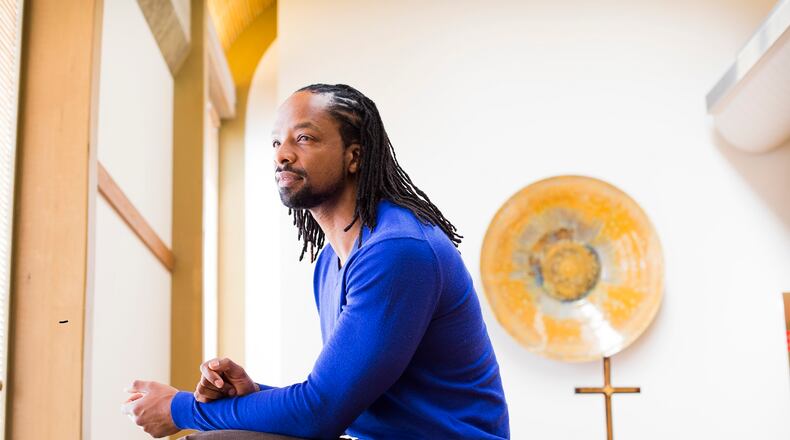Jericho Brown probably would have visited his colleagues at Emory University and celebrated at his favorite Southern-Caribbean fusion restaurant in Decatur, Ms. Icey's Kitchen & Bar. And then there would have been some dancing.
Instead, the acclaimed poet has not left his home in Decatur since venturing out briefly Monday morning to pick up takeout breakfast at a local Flying Biscuit Cafe.
This is what it is like receiving a Pulitzer Prize for poetry in the middle of a pandemic. No big parties and popping champagne corks. But Jericho -- who is rigidly practicing social distancing amid the coronavirus outbreak -- isn't complaining. He's grateful for the award for his collection of poetry, "The Tradition," adding that it has prompted hundreds of congratulatory text messages from friends, relatives and former lovers.
"As the day goes on, there are moments where I find myself in giggles," he said Tuesday. "I am sort of going on this unplanned trip down memory lane because I have phone calls from everybody I have ever known in my entire life."
In awarding it Monday, the Pulitzer Prize Board described his work as a "collection of masterful lyrics that combine delicacy with historical urgency in their loving evocation of bodies vulnerable to hostility and violence."
Born Nelson Demery III, Brown, 44, writes extensively about sexual identity, racial injustice, God and the intersection of love and violence. He had a powerful reaction to the news of the award Monday.
“I was screaming and crying. I was like, ‘Oh, this is how you act, Jericho,’” said Brown, the director of the creative writing program at Emory. “I am very happy. I am just glad for whatever attention this brings to the book and the people who need the book the most.”
Here’s a clip of Brown reading his work.
Brown’s work has been published in The New Republic, The New Yorker and The Best American Poetry. His first book, “Please,” won an American Book Award. And his second book, “The New Testament,” won an Anisfield-Wolf Book Award. In 2016, he was awarded a prestigious Guggenheim Fellowship.
“The Tradition,” Brown said, is about questioning traditions.
“We are all inventing our lives,” he said. “Invention means improvisation. Just because we were told a certain way of living is right or wrong, that doesn’t mean that we don’t have the opportunity to test what is really best for us and our people and our families.”
Brown is the second Emory poet to win the Pulitzer since 2007, when then-Emory professor Natasha Trethewey received the award for her collection, "Native Guard."
Poets Mary Ruefle, the author of “Dunce,” and Dorianne Laux, who wrote “Only As the Day is Long: New and Selected Poems,” were named finalists for the Pulitzer this year. Brown said it was “amazing to be honored along with them. I am really grateful to carry this day with them.”
He is now working on essays about poetry, music and growing up in Louisiana.
“I am finally revising these essays,” he said, “and I am going to try to put them together for something soon.”
Emory President Claire Sterk called Brown “one of the most compelling voices of our present generation.”
“All of us at Emory are incredibly fortunate to have him as a part of our community,” she said. “His creative excellence, his academic prowess and his tireless engagement as a leader of our nationally ranked creative writing program all make Emory a better place daily.”
Brown, meanwhile, hopes the Pulitzer will bring him “a little more freedom.”
“You need to be able to write from your soul, from your heart,” he said. “You are not going to say the subversive thing, you are not going to say the radical thing, if you are worried about winning a prize. You are just not. And I thank God that I wrote ‘The Tradition’ with that freedom in mind.”
“I am hoping that having won this prize — it is one prize down and therefore it is nowhere in the back of my head. I am not worried about whether or not I am going to win it. I can just freely write.”
Here is one of Brown’s poems from “The Tradition,” courtesy of Copper Canyon Press:
“Duplex”
By Jericho Brown
A poem is a gesture toward home.
It makes dark demands I call my own.
Memory makes demands darker than my own:
My last love drove a burgundy car.
My first love drove a burgundy car.
He was fast and awful, tall as my father.
Steadfast and awful, my tall father
Hit hard as a hailstorm. He’d leave marks.
Light rain hits easy but leaves its own mark
Like the sound of a mother weeping again.
Like the sound of my mother weeping again,
No sound beating ends where it began.
None of the beaten end up how we began.
A poem is a gesture toward home.
About the Author
Keep Reading
The Latest
Featured




